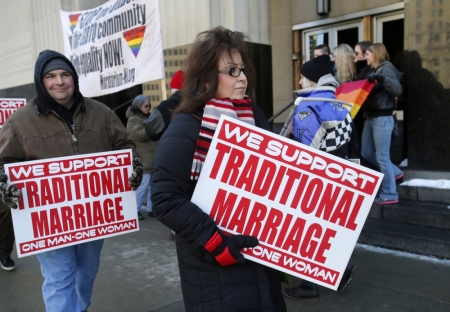Fed Appeals Court Upholds Right of States to Ban Same-Sex Marriage; Supreme Court Can No Longer Ignore Issue, Says Russell Moore

A federal appeals court in Cincinnati upheld the right of states to ban same-sex marriage by a 2-to-1 vote on Thursday. The ruling overturns lower-court decisions in Kentucky, Michigan, Ohio and Tennessee that found such restrictions unconstitutional.
Observers say the U.S. Court of Appeals for the Sixth Circuit ruling will most likely force the Supreme Court to make a decision on same-sex marriage for the nation.
"This circuit split means that the Supreme Court's ignoring of this issue will not be able to continue," said Russell Moore, president of the Ethics & Religious Liberty Commission of the Southern Baptist Convention. "The people of the states have the right to recognize marriage the way virtually every human culture has, as the union of a man and a woman. The Supreme Court should affirm this right, for all 50 states."
Moore recently held a national conference for Evangelicals, "The Gospel, Homosexuality and the Future of Marriage," designed to equip attendees to defend marriage in the culture and strengthen marriage in the church. He has also been invited by the Vatican to speak at a November colloquium in Rome, where he will provide an evangelical Protestant perspective on marriage and family — joining Pope Francis and religious leaders from all over the world.
Dale Carpenter, a professor of constitutional law at the University of Minnesota, was quoted in The New York Times as saying that the circuit split "will almost surely produce a decision from the Supreme Court, and sooner rather than later. It's entirely possible that we could have oral arguments in coming months and a Supreme Court decision by next summer."
Circuit Judge Jeffrey S. Sutton, who authored the main opinion, wrote: "When the courts do not let the people resolve new social issues like this one, they perpetuate the idea that the heroes in these change events are judges and lawyers. Better, in this instance, we think, to allow change through the customary political processes, in which the people, gay and straight alike, become the heroes of their own stories by meeting each other not as adversaries in a court system but as fellow citizens seeking to resolve a new social issue in a fair-minded way."
The decision conflicts directly with federal appeals courts in the Fourth, Seventh, Ninth, and Tenth Circuits, stated Lyle Denniston in the SCOTUSblog. He wrote that it is "precisely the kind of division of judgment that ordinarily will lead the Supreme Court to step in to resolve the split, especially on an issue of fundamental constitutional significance."
The opinion was joined by Circuit Judge Deborah L. Cook. Dissenting Senior Circuit Judge Martha Craig Daughtry called the Sutton opinion "an introductory lecture in political philosophy," but one that failed, as an appellate court decision, "to grapple with the relevant constitutional issue in this appeal," according to Denniston.
Justice Ruth Bader Ginsburg has indicated that the main reason the Court had bypassed the cases so far was that there was not a split among the courts of appeals, according to public comments.
"Now there is a split, and it is a stark one," states Denniston in his blog. "In one sweeping decision, the Sixth Circuit has given all of the states in its geographic region a victory for their bans on both initial marriages of same-sex couples and official recognition of such marriages performed outside of the couples' home states. By contrast, other federal courts have nullified identical bans in 13 states just over the past few months, with the prospect that the number would soon rise of 16 — for a total of 35 states, plus Washington, D.C., allowing such marriages."





















